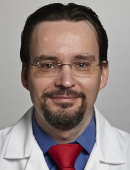Biography
Research Topics
Antigen Presentation, Autoimmunity, Chemokines, Chemotaxis, Dendritic Cells, Fibrosis, Immunology, Lung, Lymphocytes, Mucosal Immunology, Respiratory Tract
Antigen Presentation, Autoimmunity, Chemokines, Chemotaxis, Dendritic Cells, Fibrosis, Immunology, Lung, Lymphocytes, Mucosal Immunology, Respiratory Tract
